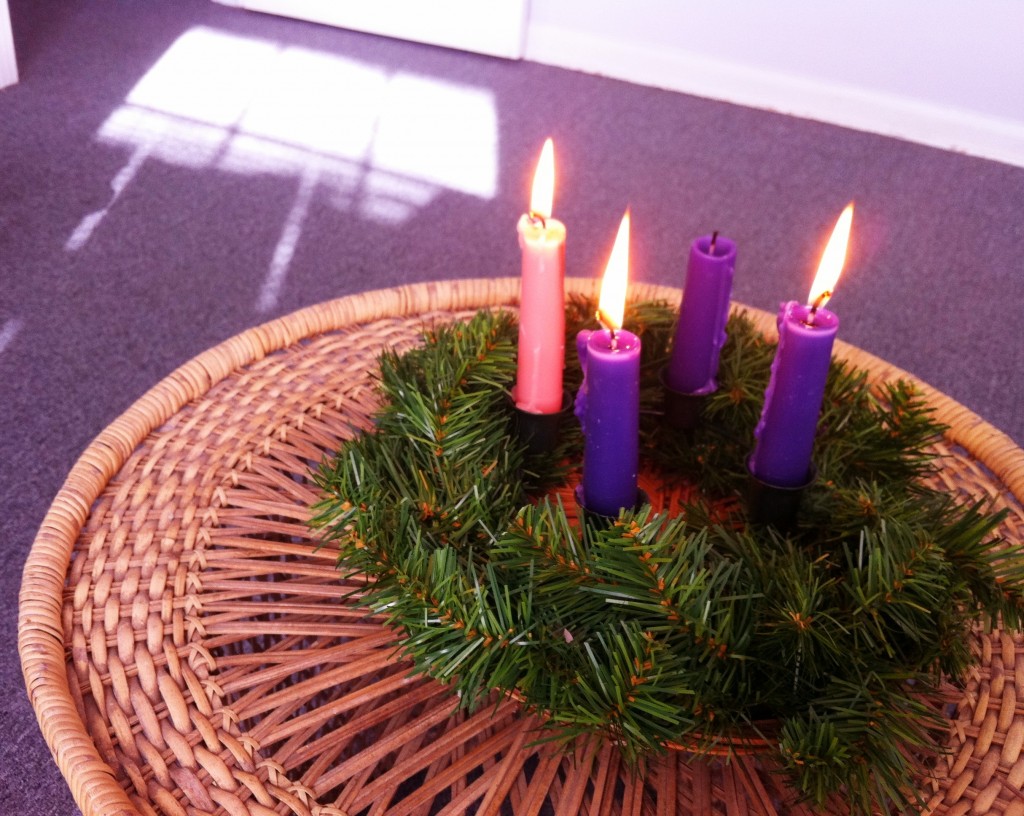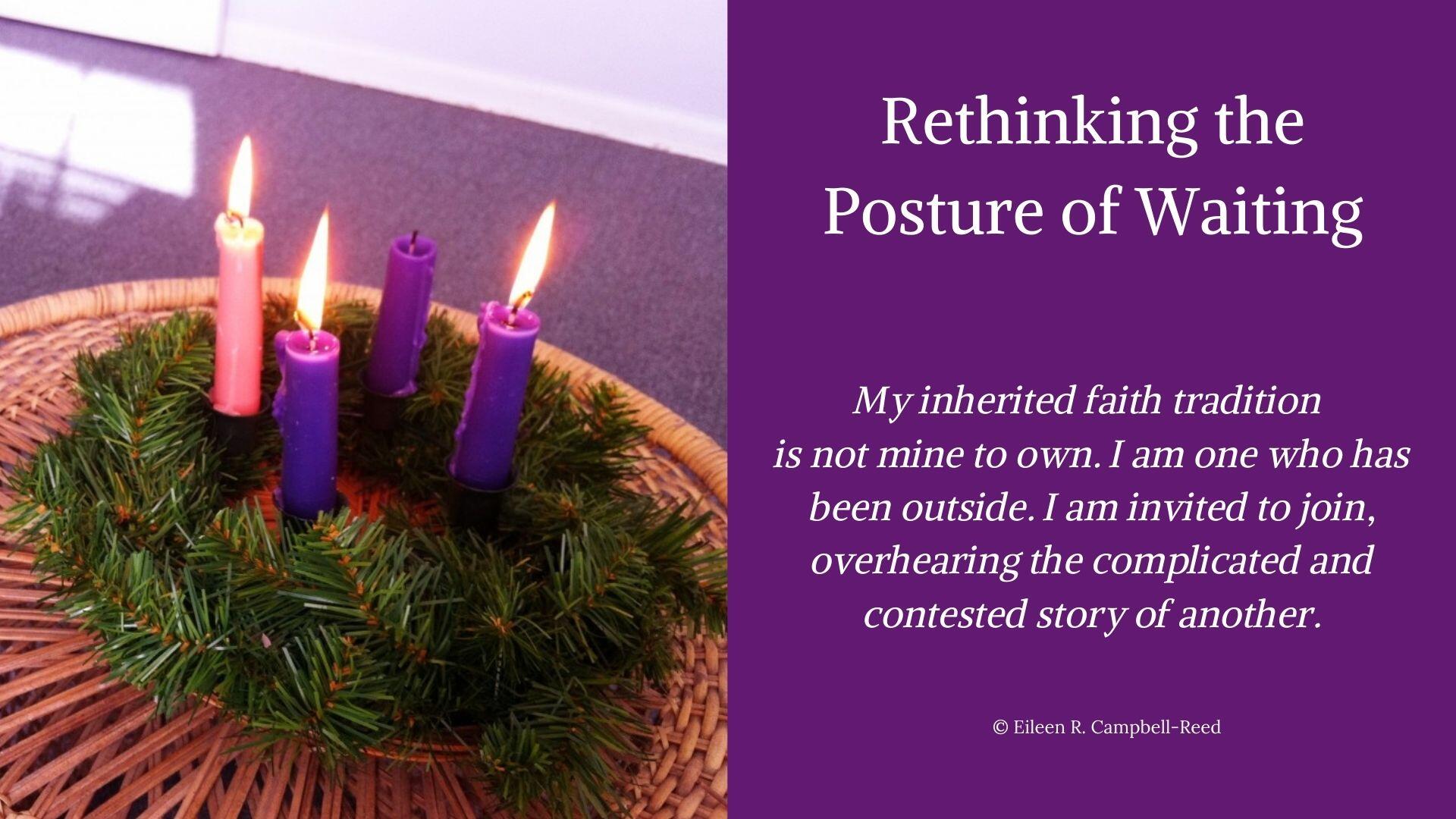Rethinking the Posture of Waiting (2011)
Here we are on the third Sunday in Advent, a celebration of Joy. We are thinking and waiting in expectation. And although my daughter awoke sick long before dawn, she is on the mend, and the day held splendid worship, card-playing, cookie-baking, and time spent with friends.
 As part of my reflections about Advent last week I said: “One significant reality about learning one’s way into a community of faith is that the stories are often approximated first. The elements are fluid. Some are imagined, and they are filtered through the wider culture as well as both understandings and misunderstandings of the teachings of churches and pastors.”
As part of my reflections about Advent last week I said: “One significant reality about learning one’s way into a community of faith is that the stories are often approximated first. The elements are fluid. Some are imagined, and they are filtered through the wider culture as well as both understandings and misunderstandings of the teachings of churches and pastors.”
This week my own imagination about the story of Jesus and the birth of Christian faith was challenged more deeply in conversation with theologian Willie James Jennings and his book The Christian Imagination: Theology and the Origins of Race. He lectured about his new book and won over an audience of students, pastors and teachers on Thursday and Friday at Luther Seminary. His arguments – developed in The Christian Imagination – provoke thinking on a number of levels about race, pedagogy and Christian theology. The time seems right to focus on one misunderstanding he challenges in particular: an Advent challenge, as I’m thinking of it.
Learning the Advent Path
The pathway I’ve taken into Christianity began in a traditional way, as far as southern US Christianity is concerned. I learned stories about Jesus in a Baptist household and church. My childhood pastor Hershel Chevallier was the one who introduced Advent to the community of faith when I was in fourth or fifth grade. Lighting a candle each of four weeks leading up to Christmas and the celebration of the birth of Jesus was a new part of worship for many in my childhood church.
I’ve come to know and love the season of Advent as the beginning of the church year. It is a time of preparation for welcoming the incarnation of God in Christ. And it points us to the many ways God appears enfleshed all around us. What I failed to recognize or appreciate fully until this week? Just how outside that story I am, and how much I’ve taken for granted about it.
Here is a quote from Professor Jennings’ book.
Gentiles, the goyim, are outside Israel, lacking intimate knowledge of the ways and struggles of life inside. Yet to even know that we are outside, that we are Gentile, that we are not addressed in the conversations of biblical Israel with its God is already to admit an entrance. Someone allowed us to draw close enough to hear that there was a conversation going on between God and a people in the first place (p. 252).
The most basic of misunderstandings is here. Christians have on the whole missed the fact that Jesus was Jewish and was part of an unfolding drama within Judaism. And we miss as well the fact that nearly all the major actors in the story of Jesus’ conception, birth, life and death are also Jewish. In the story of Jesus lies an argument that is at its heart a Jewish quarrel. As Gentiles, those not raised with a deep and abiding understanding of God’s covenant relationship with the children of Israel rooted in a particular place and time, we are first those who overhear.
When we see this reality? It changes the posture that Christians may have with regard to our so-called founding stories of faith. As Jennings says, “By recapturing the original situation out of which Gentile Christian faith must always think and imagine itself, one also captures the powerful social analog that emerges from the recreation of humanity in Jesus Christ. The first step is remembering Gentile existence” (Ibid).
Jennings is asking us to rethink our posture of faith and waiting.
Forgetting to Remember
It is our forgetting this first step of remembering, this posture of overhearing from the outside, that we perpetuate many problems. Christians in the West act as if we own the faith. We forget that we first heard another’s story. And we entered by way of joining. There is a long and treacherous history of using religion like a weapon – consciously and unconsciously – among Christians. The doctrine of “supersessionism” is both widespread and problematic. The doctrine holds that a new covenant between Christ and Christians displaces or replaces an original covenant between God and the children of Israel. This intellectual and religio-political problem of disregarding the Jewish faith for the sake of Christianity continues making problems even now.
My concern is for this year’s season of Advent. This is a once-a-year beginning for those seeking the liberating impulse of God’s good news in Christ. How shall I re-imagine my place in the story. My hope is that I might keep uppermost in my mind. My inherited faith tradition is not mine to own. I am one who has been outside. I am invited to join, overhearing the complicated and contested story of another. This adds tension to the waiting. It insists on more humility. It de-centers my place in the story.
I think I’ll need to sit quietly with this one for a little while. I am rethinking my posture of waiting. And I am leaning further into the Advent story.




